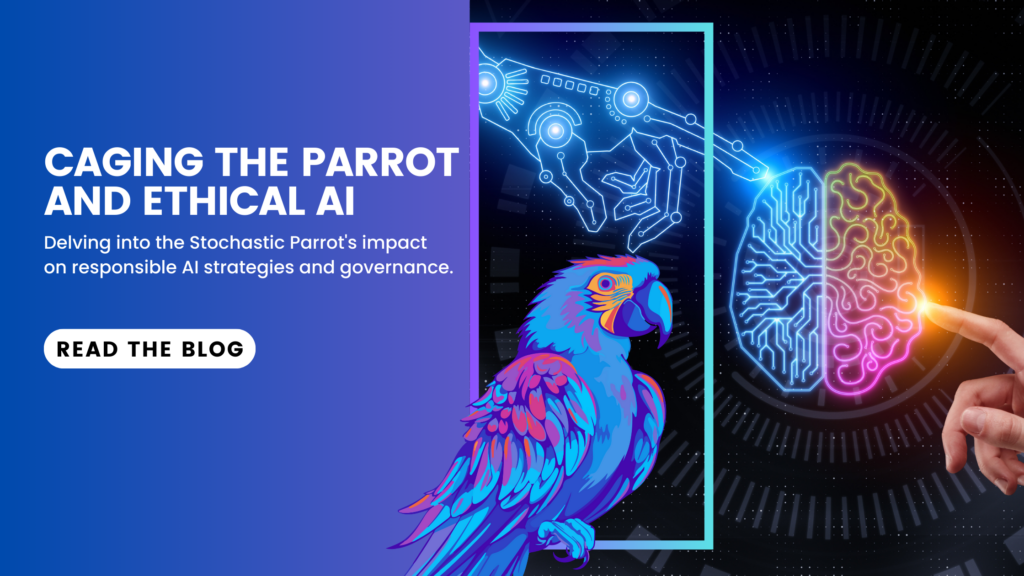
Artificial Intelligence (AI) is rapidly transforming the marketing and customer experience landscape, reshaping the way businesses engage with their customers. 87% of CEO’s agreed in a recent Gartner survey that the benefits of GenAI far outweighed the risks. However as AI integration proliferates, attention must be directed towards ensuring its ethical implications are prioritized.
Recently, the UK Engineering firm ARUP encountered a substantial loss of 20 million pounds following an incident where an employee fell victim to a deep fake AI-generated video. These and similar events as well as the way GenAI is built, have sparked crucial considerations regarding the ethical use of AI in business operations and underscored the importance of ethical AI practices.
The Stochastic Parrot & Ethical AI
In a thought-provoking paper by Emily Bender (2021) and her co-authors, including those who faced repercussions at Google, the term “the Stochastic Parrot” was coined to depict the random regurgitation of words or concepts devoid of contextual comprehension in large language models (LLMs). This concept has stirred debates, with some arguing it to be anti-AI. Bender highlighted the potential risks associated with AI LLMs, such as financial implications, environmental concerns, opaqueness, intrinsic biases, and the looming threat of deception.
These discussions underscore the growing importance of ethical considerations in the development and deployment of AI technologies, fuelling the emergence of “ethical AI” frameworks.
Defining Ethical AI
Ethical AI refers to the practice of designing and implementing artificial intelligence technologies in a way that upholds moral values and principles. It involves ensuring that AI systems are developed and used in a manner that is fair, transparent, and accountable. In the marketing and customer experience field, ethical AI entails leveraging AI technologies to enhance customer interactions while protecting consumer privacy and data security.
Ethical Guardrails
UNESCO has outlined ten core principles for a human rights centered approach to the ethics of AI. Here are five to consider.
1. Transparency and Explainability
One of the fundamental principles of ethical AI governance is transparency. Businesses must ensure that their AI systems are transparent and explainable, meaning that the decision-making processes of AI algorithms are clear and understandable. Transparency builds trust with consumers and enables businesses to address potential biases or errors in their AI systems.
2. Fairness and Bias Mitigation
Ensuring fairness in AI algorithms is crucial to prevent discrimination and bias in marketing and customer experience initiatives. Businesses should implement measures to identify and mitigate biases in their AI systems, such as conducting bias assessments, diverse dataset sampling, and regular audits of AI algorithms. By promoting fairness, businesses can enhance customer satisfaction and loyalty.
3. Data Privacy and Security
Protecting customer data privacy is a key aspect of ethical AI governance. Businesses should adhere to data protection regulations and best practices to safeguard consumer information collected through AI systems. Implementing robust data security measures, such as encryption, access controls, and data anonymization, is essential to prevent data breaches and unauthorized access.
4. Accountability and Oversight
Establishing accountability mechanisms for AI systems is critical to ensure that businesses take responsibility for the outcomes of their AI-driven initiatives. By assigning roles and responsibilities for AI governance, businesses can track the performance of AI systems, address issues promptly, and intervene in case of ethical violations. Oversight processes, such as regular compliance checks and ethical reviews, help businesses maintain ethical standards in their AI implementations.
5. Human-Centric Design
Ethical AI governance advocates for a human-centric approach to AI development, focusing on the well-being and interests of individuals affected by AI technologies. Businesses should involve diverse stakeholders, including customers, employees, and ethicists, in the design and implementation of AI systems to prioritize human values and needs. By emphasizing human-centered design principles, businesses can create AI solutions that benefit society. Ethical AI governance plays a crucial role in shaping the future of marketing and customer experience by ensuring that AI technologies are developed and deployed responsibly.
By defining ethical AI, integrating transparency, fairness, data privacy, accountability, and human-centric design into AI governance practices, businesses can enhance customer trust, mitigate risks, and drive sustainable business growth in the digital age.
